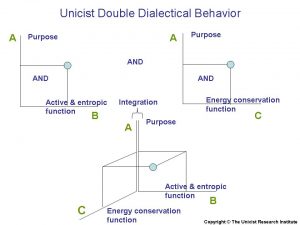How does human double dialectical behavior work?
The Unicist Dialectics allows dealing with human adaptive systems managing the integration of their double dialectical behavior.
 With this double dialectical approach (purpose – active function, purpose – energy conservation function) one can understand the structure of an adaptive system and its evolution.
With this double dialectical approach (purpose – active function, purpose – energy conservation function) one can understand the structure of an adaptive system and its evolution.
Unicist Dialectics is based on the emulation of adaptive systems, emulating the ontogenetic intelligence of nature (purpose, active principle, energy conservation principle).
Its application to human adaptive systems made the emulation of individual, institutional and social evolution possible.
To approach a reality integrated by three elements with a dualistic mind it is necessary to consider it as a dualistic integration of binary elements. To perceive dialectics it is necessary to have a high abstraction capacity.
Those who do not have the abstraction capacity consider the dialectical behavior based on observable facts of reality. They cannot differentiate essential correlations from cause-effect relations.
Individuals who have the necessary functional intelligence and the will to add value to an environment, and are able to see the double dialectics, develop two different actions to ensure results: on the one hand, they impulse action and on the other hand, they develop actions to inhibit entropy.
Individuals who approach reality using unicist thinking define strategies based on taxonomies and planed actions to influence the environment.
Peter Belohlavek
NOTE: The Unicist Research Institute was the pioneer in complexity science research and became the major research organization in the world in the field of human adaptive systems. More than 4,000 unicist ontological researches were developed since 1976 until July 2011 in the field of individual, institutional and social evolution. They included the development of the unicist ontogenetic maps (DNA) of institutions.